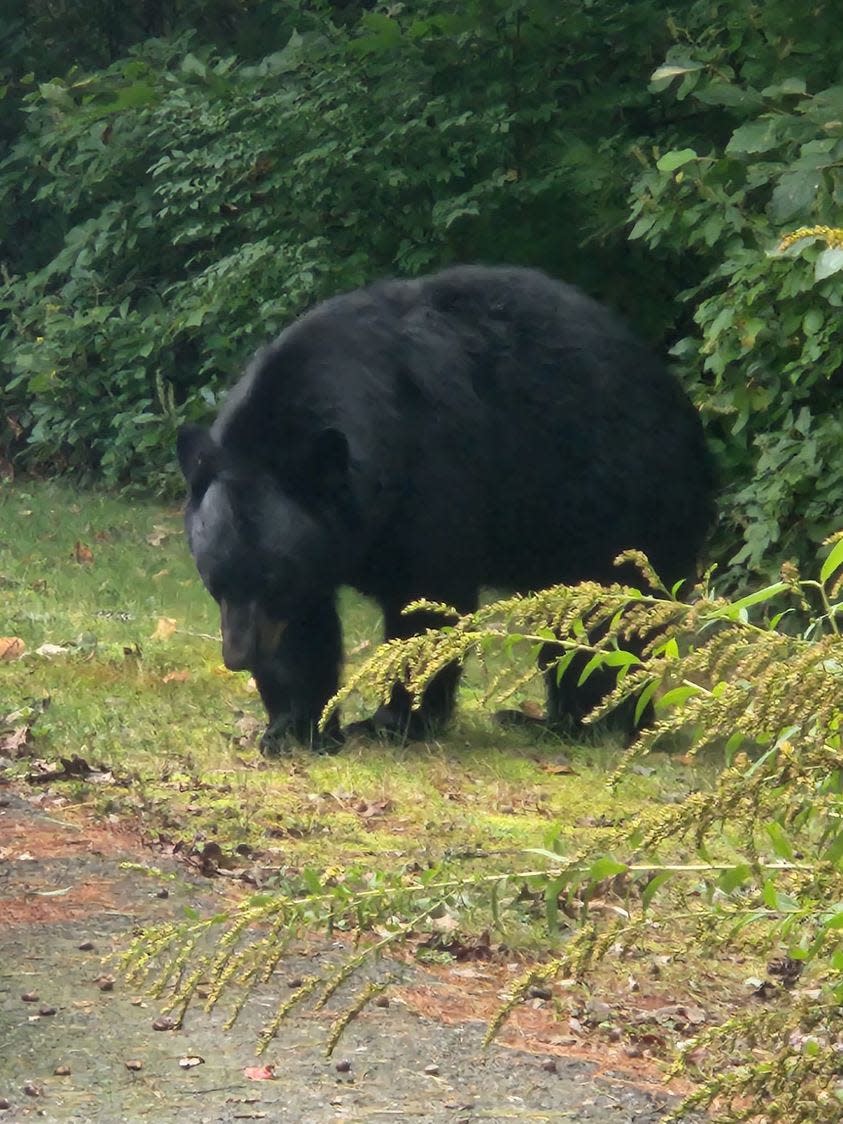Why Pumpkin the bear is considered too dangerous to relocate
HANSON – Pumpkin, the bear recently seen in Hanson, remains on the lam from police who have decided to kill the bear because he killed livestock.
Whatever his fate, Pumpkin will most likely not be relocated, a popular option among area residents but not among safety and environmental officials.
Last week, Hanson police announced on Facebook that they plan to put down Pumpkin, so named for his penchant for eating the ubiquitous fall gourd.
“Last evening one of the local bears once again got into a resident's barn and killed a goat. Since the bear ... has gotten a taste for livestock he will have to be euthanized,” Hanson police wrote in a Nov. 2 post.
Pumpkin deemed a repeat offender

This is the second time in two months that the bear is believed to have killed livestock in town, police said.
Hanson police and state Environmental Police spent two hours tracking the bear after the attack last week but were unable to safely take a shot without endangering residents, Hanson police said.
The decision to kill the bear has drawn thousands of comments online, nearly all of which are in support of either relocating the bear or simply leaving it alone.
Relocation, however, may only move the problem from one area to another, the agency said.
More: Black bear sightings on the South Shore raise questions. Here are some answers.
Relocating the bear just moves the problem to another town, officials say
“Relocation is not an option for bears causing property damage, as it would transfer this problem behavior to another community,” MassWildlife posted to its Facebook page in response to comments asking why the bear could not be moved to another, safer area. “Bears that have learned to raid chicken coops or attack livestock will not stop that behavior if moved elsewhere.”
When does bear relocation work?
That’s not to say relocation is never an option.
“The only animals that are relocated by MassWildlife and the Environmental Police are moved to resolve an immediate public safety threat, not caused by the animal’s behavior, but by the location of the animal,” the post said. “For example, in a highly urban area where the presence of the animal will likely cause a vehicle collision.”
The agency said it is not actively involved in the effort to kill Pumpkin, although it acknowledged local law enforcement’s authority to do so “if they determine there is a threat to public safety,” according to the post.
Bear 'is not just a Hanson issue'
"This is not just a Hanson issue. Black bears can travel up to 15 miles in a day," Hanson police said. “Surrounding police departments and the Environmental Police have been notified about this particular bear."
Even if Pumpkin stays in the woods, he runs the risk of encountering hunters as the second round of bear hunting for the season began Monday, Nov. 6, and runs through Nov. 25.
Male bears usually hunker down for the winter around mid-December, said MassWildlife Black Bear and Furbearer Biologist Dave Wattles.
He said there are two or three bears in Southeastern Massachusetts.
More: Buster the bear continues his travels. Here's where he was last seen
“Some bears spend their entire lives in very urban places, but the threat to the public is still minimal,” he said. “They’re using very developed places, but we can allow black bears to be there because they’re not inherently aggressive towards people.”
Bears becoming more common, comfortable in South Shore neighborhoods
Although MassWildlife staff have already spoken with landowners in the area and provided advice on how to remove food sources and protect livestock with properly maintained electric fencing, it appears Pumpkin is smarter than the average bear.
Hanson police said Pumpkin made his way into the goat owner’s barn, even though it was secured with an electric fence and reinforced doors.
“Bears are very resourceful when they find a food source. Unfortunately, the bear is becoming too comfortable in the area and has found too many food sources,” the Hanson Police Department said.
The National Park Service estimates 750,000 of them are in the U.S.
According to MassWildlife, the state's bear population is easily over 4,500, with an expected annual increase of 8%. The species has long been common in the central and western parts of the state and is slowly expanding east.
Despite the occasional appearance of black bears, the only bear species in the state, the South Shore is not considered part of the bears' normal range.
“As the bear range expands eastward toward the most densely populated communities of Massachusetts, it is critical that the public be proactive and take a few, simple precautionary measures to help keep bears wild,” MassWildlife said.
Visit Masswildlife's page on Mass.gov for more information on black bears and ways to avoid attracting them to your yard.
This article originally appeared on The Patriot Ledger: Why don't officials relocate Pumpkin the bear instead of killing it?

